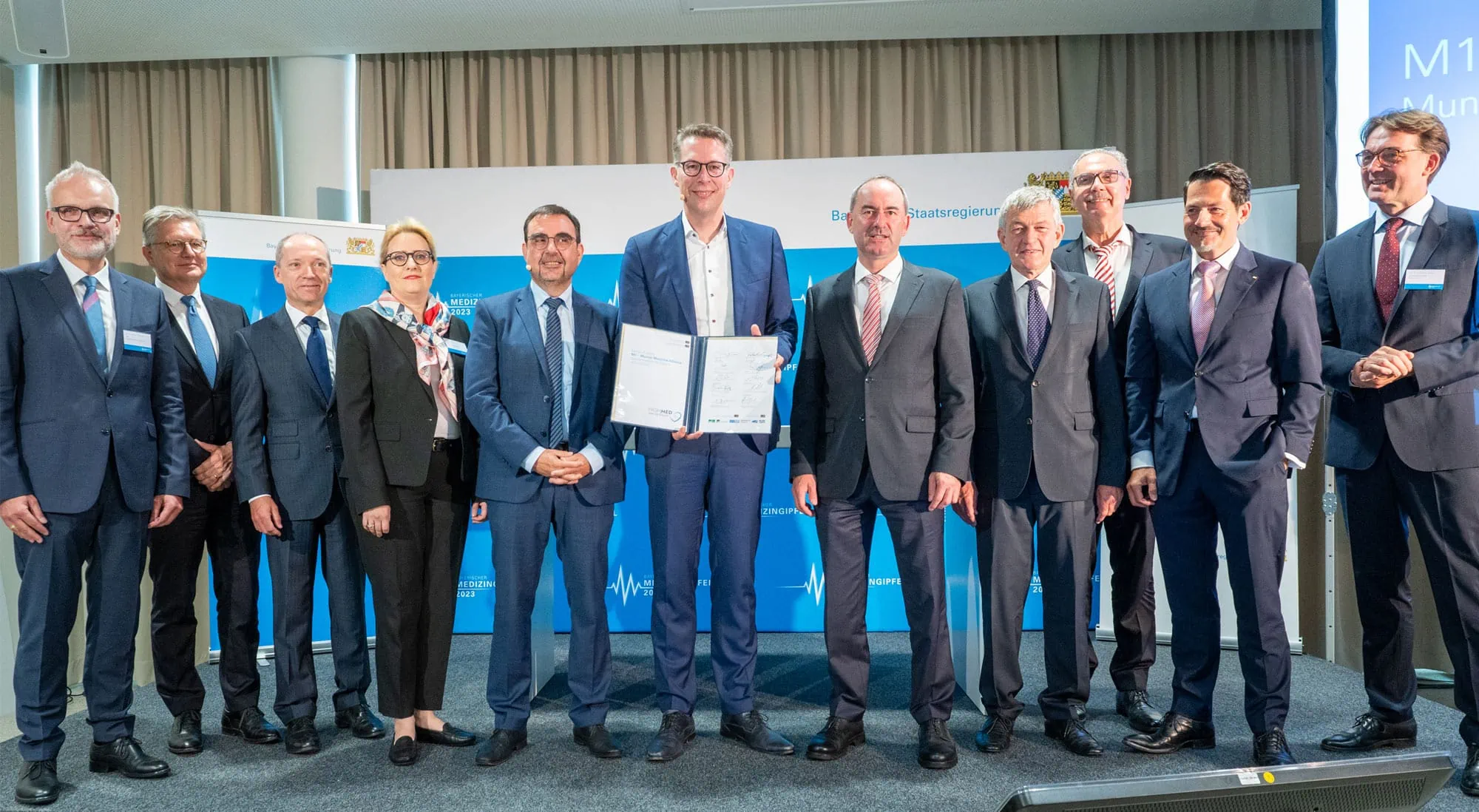M1 – Munich Medical Alliance: Becoming Germany’s No. 1 medical hub
The Bavarian Medical Summit marked the launch of the initiative, which aims to achieve key structural improvements in the healthcare system.
July, 2023

© LMU Klinikum
The signers of the Letter of Intent for M1 – Munich Medical Alliance at the Bavarian Medical Summit at Klinikum Rechts der Isar with Bavaria’s Minister of Science Markus Blume in the middle: Prof. Dr. Thomas Gudermann (1st from left), Dean of the Medical Faculty of LMU, and Prof. Dr. Markus M. Lerch (3rd from right), Medical Director and Chairman of the Board of LMU Hospital.
“Digitalization, above all, has the potential to advance medicine.”
Prof. Dr. Markus M. Lerch, Medical Director and Chairman of the Board LMU Klinikum
The launch of the M1 – Munich Medicine Alliance on Monday, 17 July, at the Bavarian Medicine Summit in the Translatum of the Technical University of Munich was a success. A letter of intent outlines the future of Germany’s top medical location. The joint agreement was signed by representatives of Munich’s universities of excellence LMU and TUM, their university hospitals, LMU Klinikum and Klinikum Rechts der Isar, the medical faculties of the two universities, the Helmholtz Centre and politicians, headed by Bavaria’s Science Minister Markus Blume and Health Minister Klaus Holetschek. M1 is embedded in the Highmed Agenda Bavaria, a new era of cutting-edge medicine and at the same time an investment initiative for the medical sector.
Prof. Dr. Markus M. Lerch, Medical Director and Chairman of the Board of the LMU Hospital, expects M1 and the Highmed Agenda Bavaria to provide central structural improvements in the healthcare system that will benefit the entire population of the Free State of Bavaria. “Digitalization, above all, has the potential to advance medicine. To this end, it is necessary to interpret the General Data Protection Regulation not in such a way as to prevent the use of health data, but to protect patients from harm caused by the misuse of their data,” Lerch demanded. “We need the data to improve the quality of healthcare and to enable medical progress in the first place. In case of an emergency, a doctor needs to know what pre-existing conditions an unconscious patient has and what medications they are taking in order to be able to help them quickly. Large health data registries also help identify rare side effects of drug combinations in order to develop better and safer medicines.”
All participants at the Bavarian Medical Summit agreed with the statement that “more digitalization means more health.” However, it is now important to involve everyone in the implementation, especially the experts by experience, namely patients and their relatives.
Alongside the event, the university hospitals each presented a special research or treatment procedure. Prof. Dr. Nikolaus Haas, Director of the Department of Pediatric Cardiology and Pediatric Intensive Care Medicine, represented the LMU Hospital with a booth as head of the LMU 3D printing laboratory. He showed a video demonstrating the production and use of 3D printed heart models for research and teaching. The models in various sizes and colors, made of a range of materials, also intrigued and impressed both Ministers Blume and Holetschek on their visit.
- Marchioninistraße 15
- 81377 München
- Phone: +49 (0)89/4400 – 72101
- ed.nehcneum-inu.dem@greb.aidualc
- www.klinikum.uni-muenchen.de



